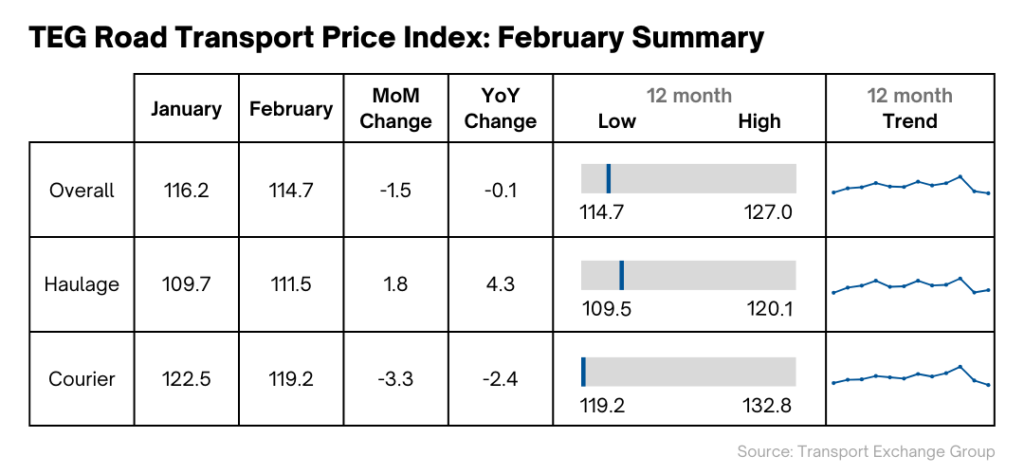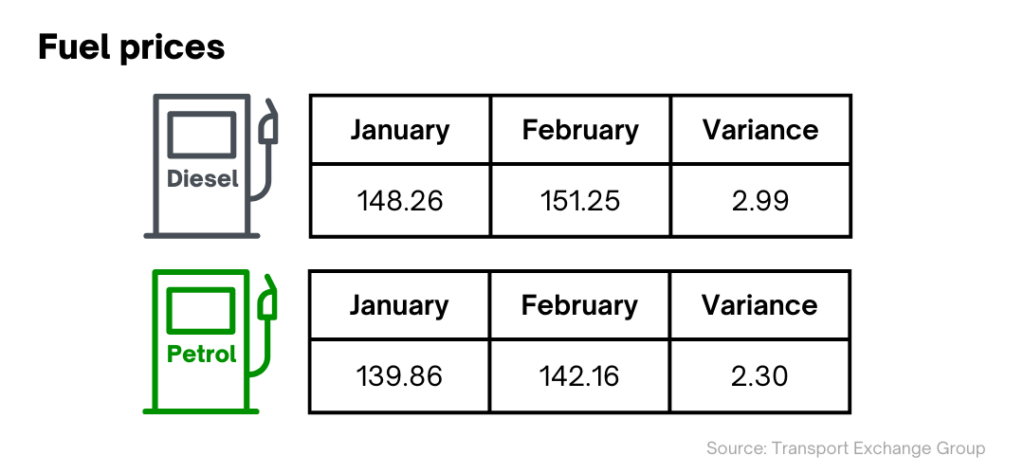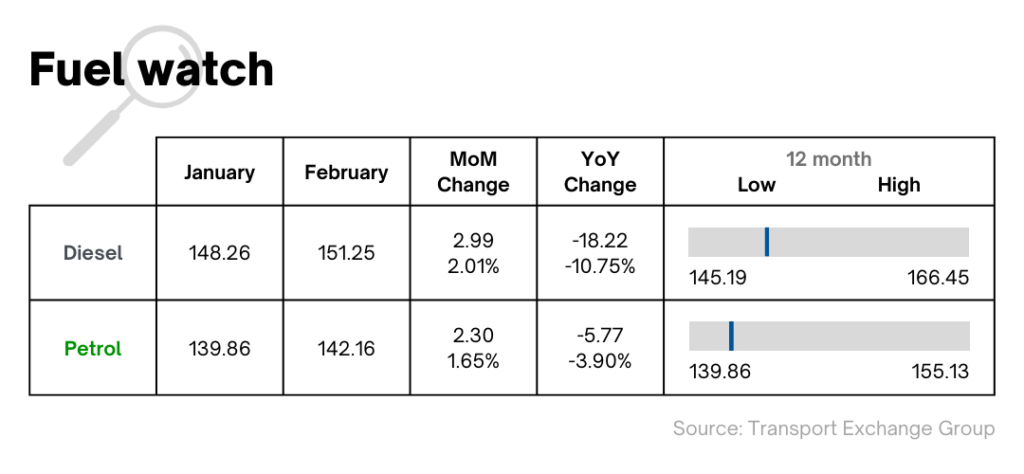Road Transport Price Index – February ’24
2nd February 2024
Transport prices reach lowest level since March 2022, in the aftermath of peak season
The latest data from the TEG Index shows overall haulage and courier prices have continued to drop in February, with the most substantial decrease seen in courier vehicle prices.
Integra makes sense of the road transport landscape. Get more insight with Integra, TEG’s enterprise solution.
TEG Road Transport Price Index - Trends at a glance
February 2024 data from the TEG Road Transport Price Index has revealed a continued downtrend in haulage and courier prices in the UK. Over the course of the month, the overall price-per-mile for haulage and courier vehicles dropped from 116.2 to 114.7 - a decrease of 1.5 points. This marks the second consecutive month of price deflation across the industry. This is typical in the aftermath of peak season, with overall prices falling in February every year since the index began.
Average road freight prices are slightly lower than in February 2023, although only by 0.1 points. It’s interesting to note these consistent year-on-year prices despite inflation.
Courier prices have decreased month-on-month, moving -3.3 points to reach 119.2. These are the lowest courier prices since April 2022. However, haulage prices have increased by 1.8 points, rising to 111.5. This is an increase of 1.6% month-on-month and 4.0% year-on-year, marking the first time haulage prices have risen in February since the index first started recording in 2019.


Industry pulse
The road freight sector has started 2024 following price trends as expected. In the post-peak season period, prices have continued to fall despite rising fuel prices. Looking to the year ahead, we can expect to see road transport prices start to rise going forward.
Across the industry, technology use and development continues to grow, improving processes and safety for those involved. Advances in AI technology are now being harnessed as part of the push to improve road user safety. Variations of AI have already been seen in autonomous vehicles and traffic management, but police trials are now underway to encourage better road safety, thanks to AI-enhanced cameras.
Fuel watch

Fuel prices have started to rise again, increasing each week since the end of January. The increases have, however, been modest: despite the rises, current prices remain similar to those of December 2023. Petrol prices reached an average of 142.16p per litre and diesel prices reached 151.25p per litre in February - an average increase of less than two percent.
Despite the slight increase, petrol remains 3.9% lower and diesel remains 10.8% lower than February 2023.
The recent rise in fuel prices is attributed to a jump in the price of oil, however, a lack of price transparency from retailers has also been called into question. The UK's petrol and diesel pricing has been under scrutiny from the Competition and Market Authority (CMA), whose July 2023 report determined that drivers were overcharged by around £900m in 2022.
Operators urged to keep on top of CPC renewals
Fleet operators have been urged to stay vigilant about Driver Certificate of Professional Competence (CPC) renewals, as nearly half a million driver qualification cards (DQCs) are set to expire this year. Drivers are required to do 35 hours of periodic training every five years to remain qualified to drive a lorry, bus or coach. The Covid-19 pandemic limited opportunities for drivers to undertake CPC courses in 2020 and 2021, leaving more people in need of refresher training than in previous periods.
Fleet transport specialist insurance broker, McCarron Coates, has highlighted the need for HGV operators to plan their approach to training so that they aren’t left unable to renew after the September 2024 deadline. Planning ahead will also mitigate any risk of a last-minute rush to complete driver training.
With drivers still in short supply across the industry, keeping qualifications up to date is essential.
AI technology implemented in driver offence detection
New AI-enhanced technology is being trialled by police forces across the UK, designed to automatically detect when drivers fail to wear a seatbelt or use their mobile phone while driving. These incidents can result in fines of up to £500 and £1000 respectively, as well as penalty points on drivers’ licences.
According to National Highways, 10 forces are now using the kit. The kit is mounted to a vehicle or trailer and has multiple cameras giving varying angles and views of the driver and passengers. Any images taken are then passed on for the police to consider whether any action should be taken.
HGV and courier drivers that rely on having a driving licence and operating a vehicle as part of their profession should be particularly careful when it comes to road safety.
In summary
February’s data from the TEG Road Transport Price Index has revealed a decline in haulage and courier prices across the UK for the second consecutive month. Trends in previous years and rising fuel prices suggest this is about to change, and we will start to see an increase in road freight prices going forward.
As the year continues, the industry will continue to place an emphasis on driver qualifications, ensuring existing drivers are able to renew their qualifications while also encouraging new drivers to train.
AI technology also seems to show promise for its road safety benefits, as police trials using AI-enhanced cameras begin.
Want to see more in depth data? Click below to visit the Integra Market Data report
Share this post on LinkedIn

